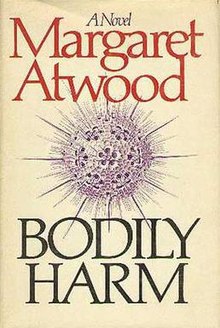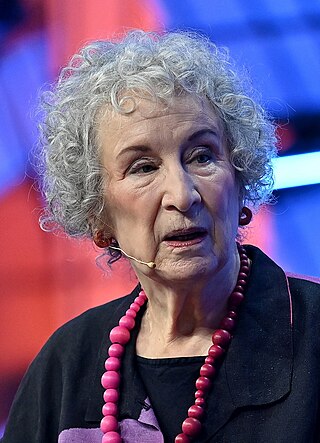
Margaret Eleanor Atwood is a Canadian poet, novelist, literary critic, essayist, teacher, environmental activist, and inventor. Since 1961, she has published 18 books of poetry, 18 novels, 11 books of nonfiction, nine collections of short fiction, eight children's books, two graphic novels, and a number of small press editions of both poetry and fiction. Her best-known work is the 1985 dystopian novel The Handmaid's Tale. Atwood has won numerous awards and honors for her writing, including two Booker Prizes, the Arthur C. Clarke Award, the Governor General's Award, the Franz Kafka Prize, Princess of Asturias Awards, and the National Book Critics and PEN Center USA Lifetime Achievement Awards. A number of her works have been adapted for film and television.

The Handmaid's Tale is a futuristic dystopian novel by Canadian author Margaret Atwood published in 1985. It is set in a near-future New England in a patriarchal, totalitarian theonomic state known as the Republic of Gilead, which has overthrown the United States government. Offred is the central character and narrator and one of the "Handmaids": women who are forcibly assigned to produce children for the "Commanders", who are the ruling class in Gilead.

Dame Margaret Drabble, Lady Holroyd, is an English biographer, novelist and short story writer.

The Blind Assassin is a novel by the Canadian writer Margaret Atwood. It was first published by McClelland and Stewart in 2000. The book is set in the fictional Ontario town of Port Ticonderoga and in Toronto. It is narrated from the present day, referring to previous events that span the twentieth century but mostly the 1930s and 1940s. It is a work of historical fiction with the major events of Canadian history forming an important backdrop, for example, the On-to-Ottawa Trek and a 1934 Communist rally at Maple Leaf Gardens. Greater verisimilitude is given by a series of newspaper articles commenting on events and on the novel's characters from a distance.
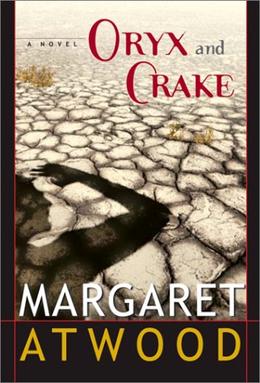
Oryx and Crake is a 2003 novel by Canadian author Margaret Atwood. She has described the novel as speculative fiction and adventure romance, rather than pure science fiction, because it does not deal with things "we can't yet do or begin to do", yet goes beyond the amount of realism she associates with the novel form. It focuses on a lone character called Snowman, who finds himself in a bleak situation with only creatures called Crakers to keep him company. The reader learns of his past, as a boy called Jimmy, and of genetic experimentation and pharmaceutical engineering that occurred under the purview of Jimmy's peer, Glenn "Crake".

The Edible Woman is the first novel by Margaret Atwood, published in 1969, which helped to establish Atwood as a prose writer of major significance. It is the story of a young woman, Marian, whose sane, structured, consumer-oriented world starts to slip out of focus. Following her engagement, Marian feels her body and her self are becoming separated. Marian begins endowing food with human qualities that cause her to identify with it, and finds herself unable to eat, repelled by metaphorical cannibalism. In a foreword written in 1979 for the Virago edition of the novel, Atwood described it as a protofeminist rather than feminist work.

Alias Grace is a historical fiction novel by Canadian writer Margaret Atwood. First published in 1996 by McClelland & Stewart, it won the Canadian Giller Prize and was shortlisted for the Booker Prize.
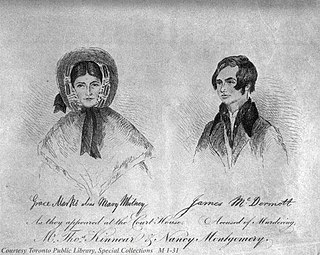
Grace Marks was an Irish-Canadian maid who was involved in the 1843 murder of her employer Thomas Kinnear and his housekeeper, Nancy Montgomery, in Richmond Hill, Ontario. Her conviction for the murder of Kinnear was controversial and sparked much debate about whether Marks was actually instrumental in the murder or merely an unwitting accessory. Marks was the subject of Margaret Atwood's historical fiction novel Alias Grace and its adaptations in other media.
"Freeforall" is a 1986 dystopian short story by Margaret Atwood, often described as a gender flipped version of her novel The Handmaid's Tale.

Cat's Eye is a 1988 novel by Canadian writer Margaret Atwood about fictional painter Elaine Risley, who vividly reflects on her childhood and teenage years. Her strongest memories are of Cordelia, who was the leader of a trio of girls who were both very cruel and very kind to her in ways that tint Elaine's perceptions of relationships and her world — not to mention her art — into her middle years. The novel unfolds in mid-20th century Canada, from World War II to the late 1980s, and includes a look at many of the cultural elements of that time period, including feminism and various modern art movements. The book was a finalist for the 1988 Governor General's Award and for the 1989 Booker Prize.
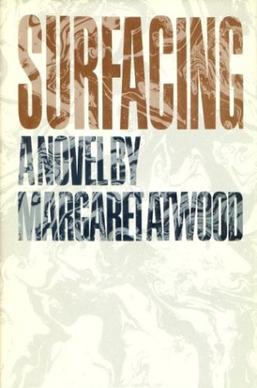
Surfacing is a novel by Canadian author Margaret Atwood. Published by McClelland and Stewart in 1972, it was her second novel. Surfacing has been described by commentators as a companion novel to Atwood's collection of poems, Power Politics, which was written the previous year and deals with complementary issues.

The Penelopiad is a novella by Canadian author Margaret Atwood. It was published in 2005 as part of the first set of books in the Canongate Myth Series where contemporary authors rewrite ancient myths. In The Penelopiad, Penelope reminisces on the events of the Odyssey, life in Hades, Odysseus, Helen of Troy, and her relationships with her parents. A Greek chorus of the twelve maids, who Odysseus believed were disloyal and whom Telemachus hanged, interrupt Penelope's narrative to express their view on events. The maids' interludes use a new genre each time, including a jump-rope rhyme, a lament, an idyll, a ballad, a lecture, a court trial and several types of songs.
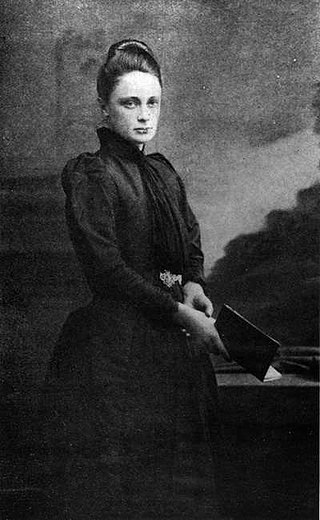
Margaret Benson was an English author and Egyptologist best known for her excavation of the Precinct of Mut.
"The Resplendent Quetzal" is a short story by Margaret Atwood. It was published in the collection Dancing Girls & Other Stories in 1977.

The Year of the Flood is a novel by Canadian author Margaret Atwood, the second book of her dystopian trilogy, released on September 22, 2009, in Canada and the United States, and on September 7, 2009, in the United Kingdom. The novel was mentioned in numerous newspaper review articles looking forward to notable fiction of 2009.
Bodily Harm may refer to:

Negotiating with the Dead: A Writer on Writing is a non-fiction work by Canadian author Margaret Atwood. Cambridge University Press first published it in 2002.
Margaret Atwood: Once in August is a 1984 documentary about Canadian writer Margaret Atwood, directed by Michael Rubbo and produced by the National Film Board of Canada (NFB). The film was made in Rubbo's style of self-conscious documentary filmmaking or metafilm.
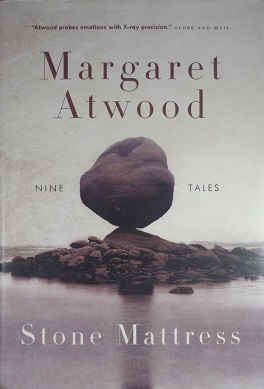
Stone Mattress is a 2014 short fiction collection by the Canadian author Margaret Atwood. Atwood describes the pieces in the collection as "tales" rather than short stories, as they draw from the mythical and fantastical aspects associated with fables and fairy tales, rather than from conventional literary realism.

The Testaments is a 2019 novel by Margaret Atwood. It is the sequel to The Handmaid's Tale (1985). The novel is set 15 years after the events of The Handmaid's Tale. It is narrated by Aunt Lydia, a character from the previous novel; Agnes, a young woman living in Gilead; and Daisy, a young woman living in Canada.
